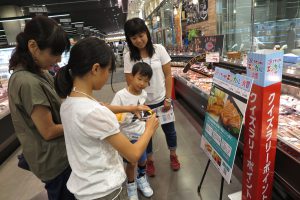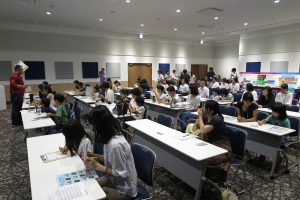親子で学ぶエシカル消費/ Learning about ethical consumption with parents and children together/ 亲子共同学习道德消费

徳島県では、県を挙げてエシカル消費の普及啓発に取り組んでいる。エシカル消費とは、倫理的消費という意味で、フェアトレードや地産地消などがそれにあたる。このエシカル消費を広く知ってもらうため、イオンモール徳島にて親子を対象にした「イオンdeエシカル消費」が開催された。

はじめにエシカル消費やそれにつながるマークの説明を受けた後、売り場に設置されたチェックポイントを回り、マークの意味やイオンでの取り組みを学んだ。チェックポイントのすぐ横には、マークがついた商品が並んでいる。参加者からは、「講義で聞くよりも、売り場で実物を見ながら学ぶほうがわかりやすい」という声が聞こえた。気をつけて見てみると、たくさんの商品にエシカルに関わるマークがついていることに気づく。
講義で紹介された「エシカル」は、
え →「え」いきょうを
し →「し」っかりと
かる →「か」んがえ「る」
(出展:一般社団法人エシカル協会 『エシカルの覚え方』 http://ethicaljapan.org/)
と覚えるそうだ。実際、買い物をするときには、その商品を購入したらどんな影響があるかを、購入する前に一度考えてみようという呼びかけである。
名目国内総生産(GDP)に占める家計消費の割合は、54.1%(平成28年度)にもなる(出展:内閣府国民経済計算)。家庭での消費は、社会に大きな影響を及ぼすことが、数字からも裏付けられている。
エシカル消費に関する普及啓発の取組として、このような講座のほかにも、消費者大学校大学院での「エシカル消費・食品表示コース」設置や今後3年間で県内全高校へのエシカルクラブ創設などが予定されている。
いつもの買い物で商品を選ぶときには、ぜひ一呼吸おいて「えいきょうを しっかりと かんがえる」を実践してみてほしい。
■Learning about ethical consumption with parents and children together
Promoting public awareness of ethical consumption is done all around Tokushima. Ethical consumption includes buying fair trade products and community supported agriculture. “Aeon de ethical consumption” was held for families to spread the idea. Participants got an explanation about labels of ethical consumption and other related ideas and went to checkpoints set up around the selling area to learn the meaning of the labels and activities attempted in Aeon. They could find labeled products right next to the checkpoints. A participant said that it is easier to learn in the field seeing real products than to listen to explanations. You can find a lot of products with the labels on them if you look carefully.
In the lecture, “ethical” (E-SHI-KA-RU in Japanese) was defined as “consider the influence sufficiently”: E: EIKYOUWO (influence), SHI: SHIKKARITO (sufficiently)
KA, RU: KANGAERU (consider). (Reference: “How to Remember Ethical” from the Ethical Association http://ethicaljapan.org). They are engaging in this simple wordplay to encourage consumers to consider ethical issues connected to their purchases. 54.1% of GDP in 2017 involved household purchases (reference: Cabinet Office of Government of Japan). It is clear that domestic consumption has a huge impact on society.
Other activities to raise public awareness of ethical consumption are planned, such as establishing an Ethical Consumption and Food Label course in the Graduate School of Consumers’ College, and founding ethical clubs in every high school in Tokushima within three years. The goal of such activities is to make consumers “consider sufficiently (their) influence” when they are shopping next time.
■亲子共同学习道德消费
德岛县正致力于向全县普及道德消费。道德消费,指的是符合道德伦理的消费,如公平贸易、地方消费等。为了让更多人了解道德消费,德岛AEON MALL开办了以亲子为对象的“AEON de Ethical 消费(道德消费)”。
首先领取道德消费相关联的标记,然后挨个找到卖场里设置的各站点,学习标记的含义和AEON为之做出的努力。站点旁就是贴有标记的商品。参加者发出了这样的的声音:“与其听课,在卖场里一边看到实物一边学习更简单易懂吧。”如此仔细寻找,消费者就能注意到有很多商品都贴上了道德消费的标记。
课上介绍的“道德消费”(Ethical)即:
E →影响(えいきょうを)
thi →认真地(しっかりと)
cal →考虑(考える)
(出处:一般社团法人道德消费协会《道德消费记忆法》http://ethicaljapan.org/)
这样就很好记了吧。实际上,就是呼吁大家购物时,买东西之前先考虑一下购买的行为会产生什么样的影响。
国内生产总值(GDP)中家庭消费已经占了54.1%(平成28年,出处:内阁府国民经济计算)。数字可以作证,家庭消费对社会有重要的影响。
普及道德消费相关的实践,除了这样的讲座,还有消费者大学校大学院的“道德消费·食品表示课程”的设置,以及今年3年间在县内所有高校创设道德消费俱乐部的计划。
大家每次选购商品时,请稍稍停一下,试试“认真考虑影响”吧。



